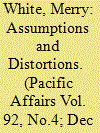| Srl | Item |
| 1 |
ID:
169213


|
|
|
|
|
| Summary/Abstract |
Ronald Dore’s work on education in Japan centred on themes of selection and equality. In his work on Tokugawa education, Dore presaged some of the emphasis he gave in his later work on quality and social and moral content in modern education. The argument of The Diploma Disease concerned the “late development effect” as a tool in understanding the emphasis on qualification and selection that led to Japan’s postwar examination hypertrophy, and in understanding the distortions and inequities that ensued. “Late ascription”—tracking and determining one’s life chances with a single examination—was one such distortion, narrowing the gate to educational and occupational success, belying the notion that Japan demonstrates a pure “meritocracy.”
|
|
|
|
|
|
|
|
|
|
|
|
|
|
|
|
| 2 |
ID:
179699


|
|
|
|
|
| Summary/Abstract |
Policy makers in various countries have made the development of community energy, especially in the form of a renewable energy cooperative (REC), a goal of energy policy. Weaknesses in qualifications of REC management teams have been identified by previous research as a barrier for the further development of RECs, especially when implementation of new business models is needed. Our study is the first to examine in detail the qualifications (human capital) and networks (social capital) of REC management; our data comes from online survey responses from 187 board members of 125 RECs in Germany. We analyzed how many RECs are planning to implement new business models, finding that less than half of the surveyed RECs are planning to do so. Those REC boards that are planning new business models will require skills in sales and marketing, but REC management has qualification weaknesses and gaps in their networks precisely in these two areas. RECs could remedy these problems by bringing onboard new management team members with complementary qualifications and networks, partnering with other RECs and organizations, and training management team members. Policy makers committed to community energy can support RECs through training programs and assistance in building partnership networks.
|
|
|
|
|
|
|
|
|
|
|
|
|
|
|
|